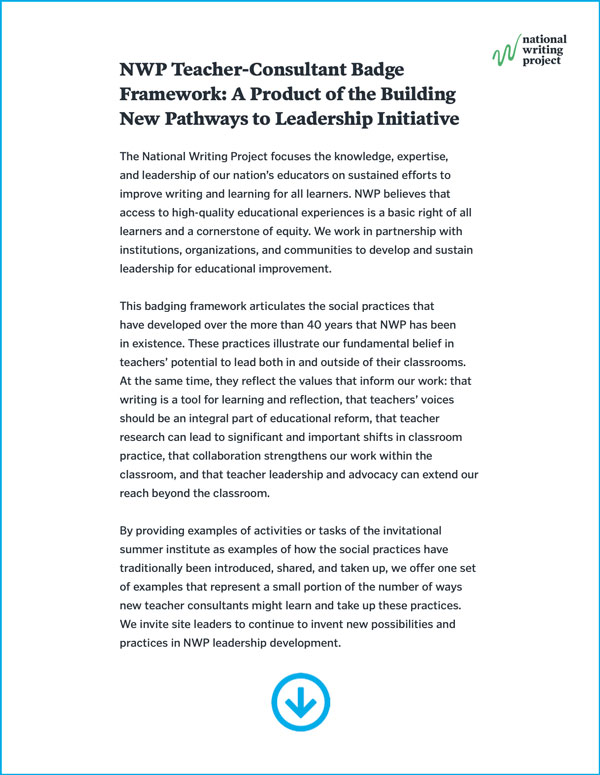Summary: As part of the Building New Pathways to Leadership Initiative, a team of NWP teacher-leaders surfaced and refined the social practices that underlie NWP teacher leadership development programs. These social practices form the framework for NWP’s Teacher-Consultant Badge.
The mission of the National Writing Project is to focus the knowledge, expertise, and leadership of our nation’s educators on sustained efforts to improve writing and learning for all learners, and the key mechanism for that is to create and support teacher leaders—also known in the network as Teacher-Consultants.
Typically, the pathway for becoming a Teacher-Consultant at a local site was to participate successfully in an Invitational Leadership Institute (ILI)—and even today the ILI remains a major pathway for engaging new teacher leaders.
However, the network also recognized that are many potential teacher leaders who are unable to access a local ILI, either because of geography, the timing of the institute, or other demands. In order to expand the reach of our work to more teachers and therefore more students, the site leaders participating in Building New Pathways took up the charge of considering how we might expand leadership beyond those educators within easy reach of NWP sites. How might we design experiences for them that provided an equivalent, enriching, and empowering experience in leadership development? What essential experiences would we stand behind?
The answer to those questions became the Six Social Practices Framework.
The Social Practices Framework articulates the social practices that have developed over the decades that NWP has been in existence. These practices illustrate NWP’s fundamental belief in teachers’ potential to lead both in and outside of their classrooms. At the same time, they reflect the values that inform our work: that writing is a tool for learning and reflection, that teachers’ voices should be an integral part of educational reform, that teacher research can lead to significant and important shifts in classroom practice, that collaboration strengthens our work within the classroom, and that teacher leadership and advocacy can extend our reach beyond the classroom.
Programs that induct educators into the Social Practices can be designed in numerous ways, giving sites the flexibility and opportunity to build and support leadership among educators not currently served. They also may help sites take advantage of new opportunities or adapt to circumstances such as the need for remote learning but providing design guidance.
The attached document discusses the Social Practices and provides examples of activities or tasks of the invitational leadership institute as examples of how the social practices have traditionally been introduced, shared, and taken up. It then offers one set of examples that represent a small portion of the number of additional ways new teacher consultants might learn and take up these practices. The examples are illustrative, and sites can use their creativity to imagine many more. The idea of a pathway to participation means that educators who complete a program or series of programs through a local site where they cumulatively take up the six Social Practices can be characterized as Teacher-Consultants by the local sites.
In Summer 2020, NWP local sites were provided the opportunity to award badges to Teacher-Consultants based on these practices. In Fall 2020, sites were able to award individual badges based on the Social Practices.
